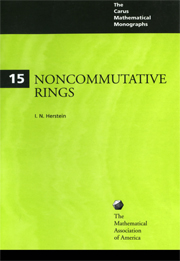7 - GOLDIE'S THEOREM
Summary
Goldie has recently proved several theorems which give penetrating information about the nature of rings subject to certain chain conditions. In the theory of rings with ascending chain conditions these theorems assume the role played by the Wedderburn theorems in the theory of rings with descending chain conditions. In fact these results are extensions of the Wedderburn theorems to a wider class of rings. Procesi gave a short and highly conceptual proof of the first of Goldie's results; we then showed how one can easily obtain the second from the first.
The proof of these theorems that we shall present here is due to Procesi and Small. It is simple, short and neat, yet it is not nearly as revealing as the proof given earlier by Procesi. For one thing, that proof actually also gives us Wedderburn's theorem for simple rings. For another, the techniques developed there allow us to proceed to a variety of results; to cite an instance one readily obtains a recent result of Faith and Utumi. Be that as it may since our primary interest will be in the Goldie theorems we shall content ourselves here with the Procesi-Small approach to the subject.
Ore's Theorem. As is elementary and well known, one can imbed a commutative integral domain in a field, the field being nothing else than the fractions created from the elements of the domain.
- Type
- Chapter
- Information
- Noncommutative Rings , pp. 169 - 186Publisher: Mathematical Association of AmericaPrint publication year: 1968



